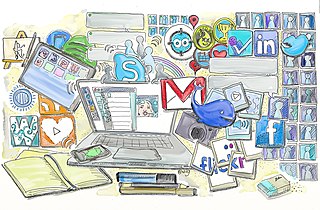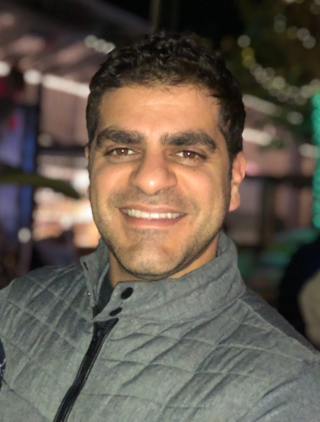A virtual community is a social work of individuals who connect through specific social media, potentially crossing geographical and political boundaries in order to pursue mutual interests or goals. Some of the most pervasive virtual communities are online communities operating under social networking services.
An online community, also called an internet community or web community, is a community whose members interact with each other primarily via the Internet. Members of the community usually share common interests. For many, online communities may feel like home, consisting of a "family of invisible friends". Additionally, these "friends" can be connected through gaming communities and gaming companies. Those who wish to be a part of an online community usually have to become a member via a specific site and thereby gain access to specific content or links.
Fotolog.com was a social network for sharing primarily photos. The site claimed that its vision was to build a "good" social network which prioritizes the well-being of users. The site only allowed all members of the community to post once per day, which, according to the site, was aimed to end the overuse of social networking today and the meaningless consumption of content.
WebMD is an American corporation which publishes online news and information about human health and well-being. The WebMD website also includes information about drugs and is an important healthcare information website and the most popular consumer-oriented health site.
The social web is a set of social relations that link people through the World Wide Web. The social web encompasses how websites and software are designed and developed in order to support and foster social interaction. These online social interactions form the basis of much online activity including online shopping, education, gaming and social networking services. The social aspect of Web 2.0 communication has been to facilitate interaction between people with similar tastes. These tastes vary depending on who the target audience is, and what they are looking for. For individuals working in the public relation department, the job is consistently changing and the impact is coming from the social web. The influence held by the social network is large and ever changing.
Internet privacy involves the right or mandate of personal privacy concerning the storage, re-purposing, provision to third parties, and display of information pertaining to oneself via the Internet. Internet privacy is a subset of data privacy. Privacy concerns have been articulated from the beginnings of large-scale computer sharing and especially relate to mass surveillance.

.ms is the Internet country code top-level domain (ccTLD) for Montserrat, a British Overseas Territory.

Image sharing, or photo sharing, is the publishing or transfer of digital photos online. Image sharing websites offer services such as uploading, hosting, managing and sharing of photos. This function is provided through both websites and applications that facilitate the upload and display of images. The term can also be loosely applied to the use of online photo galleries that are set up and managed by individual users, including photoblogs. Sharing means that other users can view but not necessarily download images, and users can select different copyright options for their images.

A social networking service or SNS is a type of online social media platform which people use to build social networks or social relationships with other people who share similar personal or career content, interests, activities, backgrounds or real-life connections.

User-generated content (UGC), alternatively known as user-created content (UCC), is generally any form of content, such as images, videos, text, testimonials, and audio, that has been posted by users on online content aggregation platforms such as social media, discussion forums and wikis. It is a product consumers create to disseminate information about online products or the firms that market them.
WHOIS is a query and response protocol that is used for querying databases that store an Internet resource's registered users or assignees. These resources include domain names, IP address blocks and autonomous systems, but it is also used for a wider range of other information. The protocol stores and delivers database content in a human-readable format. The current iteration of the WHOIS protocol was drafted by the Internet Society, and is documented in RFC 3912.
Online health communities are online social networks related to health. They primarily provide a means for patients and their families to learn about illnesses, to seek and offer social support, and to connect with others in similar circumstances. These online groups can be composed of individuals with illnesses, groups of medical professionals with shared interests, non-professional caregivers and family of patients, or a combination. The term "online health community" is primarily academic jargon.

PatientsLikeMe (PLM) is an integrated community, health management, and real-world data platform. The platform currently has over 830,000 members who are dealing with more than 2,900 conditions, such as ALS, MS, and epilepsy. Data generated by patients themselves are collected and quantified with the goal of providing an environment for peer support and learning. These data capture the influences of different lifestyle choices, socio-demographics, conditions and treatments on a person's health.

Xtube was a Canadian pornographic video hosting service and social networking site based in Toronto, Ontario. It was established in 2006 and is notable for being the first adult community site to allow users to upload and share adult videos. Xtube was not a producer of pornography, instead it provided a platform for content uploaded by users. User-submitted content included pornographic videos, webcam models, pornographic photographs, and erotic literature, and incorporated social networking features.

Chatroulette is an online chat website that pairs random users with a choice between two other users for webcam-based conversations. Visitors to the website begin an online chat with another visitor. At any point, either user may leave the current chat by initiating another random connection.
Since the arrival of early social networking sites in the early 2000s, online social networking platforms have expanded exponentially, with the biggest names in social media in the mid-2010s being Facebook, Instagram, Twitter and Snapchat. The massive influx of personal information that has become available online and stored in the cloud has put user privacy at the forefront of discussion regarding the database's ability to safely store such personal information. The extent to which users and social media platform administrators can access user profiles has become a new topic of ethical consideration, and the legality, awareness, and boundaries of subsequent privacy violations are critical concerns in advance of the technological age.

Wall.fm is an online service for people to build and host social networking services, powered by Oxwall software. Wall.fm allows users over 18 years old to register a free account and create custom social networking websites. The site creation process does not involve any coding, and consists of only two steps. The distinctive Wall.fm features are user roles, customizable themes, activity newsfeed, website/profile/content privacy, monetization pack. One of its main competitive advantages is that the service is built on an open source platform, which means a certain degree of freedom for site owners. Wall.fm offers three plans: Starter, Pro and Ultimate. Plans offer different feature sets, disk space and bandwidth, individual support and vendor's branding removal. Every plan offers free trial.

Mastodon is a free and open-source software for running self-hosted social networking services. It has microblogging features similar to Twitter, which are offered by a large number of independently run nodes, known as instances or servers, each with its own code of conduct, terms of service, privacy policy, privacy options, and content moderation policies.

Armen Berjikly is an Armenian-American entrepreneur and technologist, known as the founder and chief executive officer of both artificial intelligence company Kanjoya, and social network Experience Project. Berjikly's professional focus is on improving the relationship between technology and human emotions.
Pillowfort is an American social media networking service and microblogging website. The website was launched in 2017 and is currently in open beta. As of October 2020, the site had more than 100,000 users.